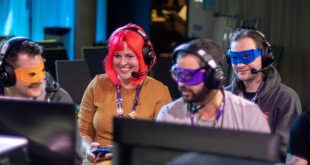 Ruth Dickens, programmer at Red Kite Games, explains how she went from being a science student at university to working on a retail release starring the gremlin Ninja of the Nth Dimension thanks to the Sumo Digital Academy.
Ruth Dickens, programmer at Red Kite Games, explains how she went from being a science student at university to working on a retail release starring the gremlin Ninja of the Nth Dimension thanks to the Sumo Digital Academy.
How did you get into games programming?
I started out in science, studying biology at university and always thought I’d go into conservation, but when I graduated I realised as much as I enjoyed learning about biology it wasn’t the career I wanted. I’d been interested in games for a long time but had always dismissed it because I didn’t know about computers and it felt intimidating. But I decided to give it a go anyway, and tried learning to program, starting with an online course on how to make games in C# using the Unity Engine. I found that not only was it much more achievable and doable than I had ever thought it was, but I also really enjoyed it and fell in love with the creative problem solving aspect of it.
What has been your proudest achievement so far?
It has to be working as a team with the other apprentices to release Zool on the PlayStation. It was a great project and it was awesome to see everyone’s hard work come together to produce something that other people could actually play.
What has been your biggest challenge to date?
Coming into games from a non-traditional background, I’ve struggled a lot with imposter syndrome, which was especially hard at the beginning when I ran into difficult problems to solve. But as challenging as they were at first, it’s been really empowering to work through those problems and see that as hard as it looks at first I can do it. The imposter syndrome is still there sometimes but I am very proud of how far I’ve come since the beginning.
What do you enjoy most about programming?
My favourite part is how it combines creativity and logical thinking. I get to be a part of making something creative, while using my problem solving skills to work out the best way to get the game working.
What’s your biggest ambition in games?
I’m really excited to be a part of a larger team and work on live projects that people will recognise and play. It’ll be amazing one day to point at a mechanic in a game that people are using and think, ‘I did that’.
What advice would you give to someone else aspiring to work in games?
The most valuable skill for programmers is their problem solving skills. Even if you’ve never done programming before, it’s not as scary as it seems and there are lots of resources out there to help you learn how to code. The important thing is to be able to work through a problem and not give up!

 MCV/DEVELOP News, events, research and jobs from the games industry
MCV/DEVELOP News, events, research and jobs from the games industry




